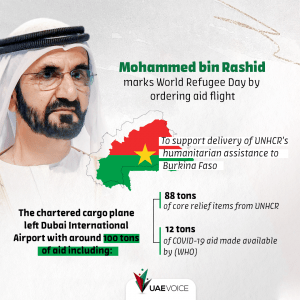The UAE celebrates the International Refugee Day, which falls on June 20 of each year, in a flag characterized by the outbreak of the new Coronavirus, which exacerbated the suffering of refugees and placed additional pressure on the donor countries.
Despite the crisis, the UAE reaffirms its continued emphasis on adhering to its humanitarian stances in support of refugee issues in various regions and alleviating their worsening suffering by providing all means of material and moral support to them.
International Refugees Day

World Refugees Day falls this year, as the world faces a crisis of proliferation of the new Coronavirus, which has exacerbated the suffering of refugees through the challenges and difficulties that have arisen in the face of efforts to provide basic services and deliver humanitarian aid.
The country is “trying to overcome all the difficulties and obstacles imposed by the outbreak of the epidemic from the system of human values on which its local community is based on tolerance, love and respect for all cultures, religions and human races.”
The report adds: “Since the beginning of this year, shipments of humanitarian aid and medical supplies launched from the UAE territories to all continents of the world have strengthened the capacities of many governments and international organizations to cope with the repercussions of the epidemic in refugee camps and areas.”
The agency listed the humanitarian initiatives issued by the UAE during 2020
Somalia
On May 12, Mohammed bin Rashid Al Maktoum, Vice President and Prime Minister of the UAE and Ruler of Dubai, ordered to provide urgent humanitarian assistance to Somalia to support efforts to combat the emerging Corona epidemic, in addition to lending a hand and helping those affected by the devastating floods that struck Somalia due to the torrential rains that witnessed East Africa recently.
International Humanitarian City
The UAE’s assistance comes at the time, in response to the call of the World Health Organization and the United Nations High Commissioner for Refugees, where the International Humanitarian City for Services immediately flew to Mogadishu, the Somali capital, with more than 35 tons of medical equipment and humanitarian aid that contributed to enhancing the capacity of Somalia to tackle the Corona epidemic, as well as support relief and subsistence operations for the thousands of people affected by the floods who were forced to abandon their homes due to the torrents, and then provide them with the necessary essentials for living.
Refugees in Greece
Last February, the UAE Red Crescent distributed winter aid, which benefited 125,000 refugees in Greece affected by the harsh climatic conditions, which included heating devices, blankets, blankets and food parcels, to protect refugees from the consequences of lower temperatures, and to alleviate the outbreak of winter diseases among refugees, especially children.
Rohingya help
The UAE Red Crescent continued to provide humanitarian assistance to Rohingya refugees in Bangladesh.
It included the distribution of various relief items, which benefited 45,000 refugees in the camps spread in Cox’s Bazar city and included food parcels, shelter and heating materials, clothes, hygiene materials and food supplements for children, in addition to supplies Educational and teaching aids.
Syrian refugees
The authority began early 2020 to implement a winter aid campaign worth 15 million dirhams, benefiting one million people in Jordan, Iraq, Egypt, Lebanon and Greece, most of whom were Syrian refugees.
Education support
The UAE efforts in providing an appropriate education for refugees around the world did not stop, too. The “School in 1000 Villages” initiative, which is affiliated with the e-School platform, which is part of the projects of the Mohammed bin Rashid Al Maktoum International Initiatives Foundation, continued its usual support from modern electronic devices and innovative technologies to Students in refugee camps in Jordan and remote villages that suffer from weak adequate infrastructure to connect to the Internet or the lack of special technical devices in light of the closure of schools and the activation of distance education plans.
The “School in 1000 Villages” initiative team continued its tasks aimed at providing the best techniques of distance education without the need for direct connection to the Internet to student groups living in remote villages at the level of the Arab region and Africa, as the team was able to overcome the challenges resulting from the outbreak of a pandemic Corona the newcomer “Covid 19” globally, and the resulting stop of air traffic and the closure of countries to their borders, as well as the closure of some cities and regions.





